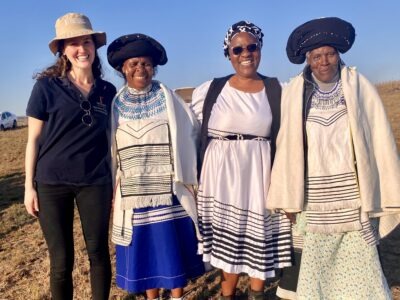All agriculture depends on specific climate conditions. Serious climatic changes adversely affect farming practices, crop growth, and product quality. Smallholder farmers in northern Ghana, like many farmers around the world, are under threat from climate change.
To deal with this risk, the ACDI/VOCA-implemented USAID/ADVANCE project promotes climate-smart agriculture practices among smallholder farmers in the region. Climate-smart agriculture involves a range of practices aimed at helping farmers adjust to climate change and increase food production while reducing greenhouse emissions from farming activities.
To achieve this, the project promotes minimum tillage, use of cover crops, and early-maturing seed varieties. ADVANCE also provides daily weather forecasts to farmers, and supports bushfire prevention campaigns in the dry season.
Minimum-Tillage Method Applied to Northern Ghana’s Fragile Soil
Soils in northern Ghana are fragile. Ploughing and mono-cropping deplete the soil's fertility and degrade the land. To avoid this, ADVANCE has introduced the minimum-tillage method. Here, rippers cut through the soil in a line to open it up for planting healthy crop rows. This technique breaks the hard pan to allow for deep roots, but leaves the soil minimally disturbed compared with conventional ploughing. ADVANCE expects to train 2,600 farmers on minimum tillage in the next two months.
 |
 |
Cover Crops Used to Prevent Erosion and Boost Soil Fertility
The use of cover crops allows the soil surface to be covered at all times to protect it from erosion, thus avoiding nutrient loss. Since July 2015, ADVANCE has used demonstration plots to train 1,500 farmers from six farming communities on cover crops. The farmers assess various cover crops. Cover crops such as pigeon pea, cowpea, Mocuna, Dolicos, and Stylosanthes are readily available in northern Ghana and are easy to propagate by seed. They are a good source of organic matter and allow microbes to improve soil fertility. They are also good for human and animal consumption.
Mobile Forecasts and Early-Maturing Maize Help Farmers Weather Effects of Climate Change
The project promotes early-maturing maize varieties that are adaptable to lower rainfall and increased drought. Farmers using these varieties reduce the risk of crop loss in the face of reduced rainfall. In addition, daily weather forecasts help smallholder farmers determine the likelihood and intensity of rains so that they can plan their daily farming activities accordingly. Close to 5,000 farmers access daily weather information provided by Ignitia Ghana Ltd.
ADVANCE is collaborating with the USAID-funded Agriculture Transfer Technology project to set up three learning centers in northern Ghana to ensure better understanding of the approaches and farmers' adoption of them. The centers help farmers learn more about various climate-smart farming practices, try out appropriate equipment, and buy suitable seed.
By the 2018 close of the project, 20,690 farmers made up of 90 nucleus farmers, 600 outgrowers, and an estimated 20,000 smallholder farmers will be reached with climate-smart agriculture. It is estimated that close to 6,000 acres of land will be tilled using minimum-tillage techniques in the project's operational areas. The project is monitoring how farmers' increased adoption of its practices improve yields and bring about economic benefits.





